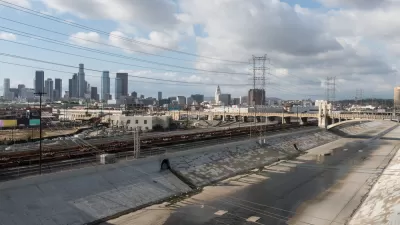Larry Kosmont, CRE, President and CEO of Kosmont Companies, spoke with The Planning Report about tools for creating economic development in California without redevelopment agencies and traditional tax increment financing.
Larry Kosmont, CRE, is President and CEO of Kosmont Companies—a real estate, finance, and economic development advisory firm specializing in public-private partnerships. He has advised numerous municipalities, as well as serving in local government himself in the Southern California region. The Planning Report talked with Kosmont about tools for creating economic development in California without redevelopment agencies, focusing on the potential impacts of publically owned properties and special districts in accomplishing redevelopment goals, as well as the challenges to such approaches.
California Governor Jerry Brown signed ABx1 26 into law in 2011, amending the California Community Redevelopment Law to address the state’s budget deficit. The bill dissolved all California redevelopment agencies and prevented RDAs from engaging in new activities while outlining a process for winding down the RDA’s financial affairs. It also outlined a process for distributing funds from the former redevelopment agencies to other local taxing entities, such as school districts. Since then, urban planners, real estate leaders, and those involved in economic development have struggled to come up with new tools for cities and developers to use to channel new urban development. As Kosmont notes, "when we had tax increment and redevelopment, we had a power tool, and now that we don’t, we’re down to hand tools. It’s not like we can’t figure out how to do it. It just takes longer, it’s riskier, more complicated, and overall not quite as specifically effective."
FULL STORY: Economic Development in a Post-Redevelopment World

Planetizen Federal Action Tracker
A weekly monitor of how Trump’s orders and actions are impacting planners and planning in America.

Map: Where Senate Republicans Want to Sell Your Public Lands
For public land advocates, the Senate Republicans’ proposal to sell millions of acres of public land in the West is “the biggest fight of their careers.”

Restaurant Patios Were a Pandemic Win — Why Were They so Hard to Keep?
Social distancing requirements and changes in travel patterns prompted cities to pilot new uses for street and sidewalk space. Then it got complicated.

Platform Pilsner: Vancouver Transit Agency Releases... a Beer?
TransLink will receive a portion of every sale of the four-pack.

Toronto Weighs Cheaper Transit, Parking Hikes for Major Events
Special event rates would take effect during large festivals, sports games and concerts to ‘discourage driving, manage congestion and free up space for transit.”

Berlin to Consider Car-Free Zone Larger Than Manhattan
The area bound by the 22-mile Ringbahn would still allow 12 uses of a private automobile per year per person, and several other exemptions.
Urban Design for Planners 1: Software Tools
This six-course series explores essential urban design concepts using open source software and equips planners with the tools they need to participate fully in the urban design process.
Planning for Universal Design
Learn the tools for implementing Universal Design in planning regulations.
Heyer Gruel & Associates PA
JM Goldson LLC
Custer County Colorado
City of Camden Redevelopment Agency
City of Astoria
Transportation Research & Education Center (TREC) at Portland State University
Camden Redevelopment Agency
City of Claremont
Municipality of Princeton (NJ)




























